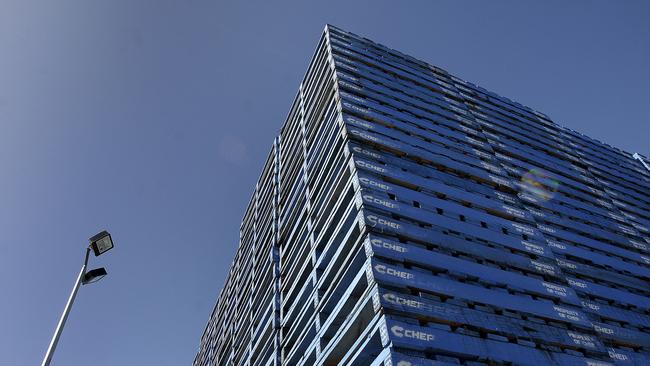Brambles struggling to retrieve CHEP wooden pallets during amid supply chain woes during pandemic
Brambles has warned that its CHEP wooden pallets are taking longer to relocate, repair and recycle for the next customer as the pandemic disrupts global supply and transport chains.

The Covid crisis has claimed another victim with logistics giant Brambles struggling to track down its CHEP wooden pallets to repair and recycle as the pandemic hits supply and transport chains.
Brambles — the owner of the largest pool of reusable pallets in the world — has revealed that the disruptions to supply chains and constraints on shipping, transport, labour and lumber had increased costs across its business in the first quarter to September and generated a like-for-like drop in volumes for its key North American business.
The company has also raised the spectre of inflation creeping into its business from higher charges linked to lumber, labour and transportation costs.
Brambles has warned that the imbalance between pallet demand and supply in North America may not right itself until the fourth quarter.
The headaches for logistics providers caused by the pandemic has been particularly acute for Brambles, causing major disruptions for simple tasks such as collecting, moving and repairing existing CHEP pallets for customers while the return of used pallets from customers also weighed down its business.
A trading update provided to the market before Brambles annual general meeting showed that reported sales revenue from continuing operations of $US1.292 billion ($A1.74bn) for the first three months of the 2022 financial year, representing an increase of 11 per cent on the prior corresponding period
At constant exchange rates, group sales revenue rose 9 per cent on the prior corresponding period, reflecting rollover pricing benefits from the prior year and ongoing commercial discipline to recover inflation and other cost-to-serve increases in all regions. This growth was expected to moderate to 5 to 7 per cent for the full year.
Brambles said that volumes were in line with the prior corresponding period as net new business growth of 2 per cent, primarily in the European pallets and Australian businesses, was offset by lower like-for-like volumes in North America largely due to pallet availability constraints.
CHEP Americas sales revenue rose 9 per cent, but new business growth in the region was modest and like-for-like volumes declined in North America as the business cycled strong pandemic related demand in the prior year and pallet availability constraints impacted volume growth with new and existing customers in the quarter.
Brambles chief executive Graham Chipchase laid the blame for the constrained performance of its US business and elevated costs across its business on the disruptions to global supply chains and the impact this had on the movement of its pallets, the backbone of its global logistics network.
“Pallet availability remained challenging in the first quarter with industry-wide shortages of new pallet supply across the globe as well as lower levels of pallet returns and longer cycle times in our North American business,” Mr Chipchase said.
“This was a contributor to the decline in like-for like volumes in North America and contributed to the lower rates of new business growth across the Americas and Europe, as we prioritised servicing existing customer demand over new customer wins.
“With sub-optimal levels of plant stock across our network, we incurred additional plant and transport costs to collect, relocate and repair existing pallets, which drove further network inefficiencies as we continue to respond to volatile customer demand.”
Mr Chipchase said Brambles was progressively rebuilding its pallet pools by purchasing new pallets as supply becomes available and continuing to drive asset efficiency improvements.
“Specifically, in North America we are implementing the asset productivity and pricing initiatives outlined at the full year result announcement and recent investor day. With limited access to lumber and new pallets and ongoing disruptions to global supply chains, we do not expect pallet availability and balances across our North American network to return to more normal levels until the fourth quarter of the fiscal year.”
Inflationary pressure has also reared its head.
“We continue to operate in a high inflationary environment with pallet availability constraints and ongoing lumber, labour and transport scarcity disrupting supply chains and driving increased costs across our businesses,” Mr Chipchase said.
Brambles forecast annual sales revenue growth of between 5-7 per cent with expected moderation from 9 per cent growth in the first quarter, due to stronger revenue comparatives last year.
The group expects annual underlying profit growth between 1-2 per cent, including approximately $US50m of short-term transformation costs. Excluding transformation costs, underlying profit growth is expected to be between 6-7 per cent.



